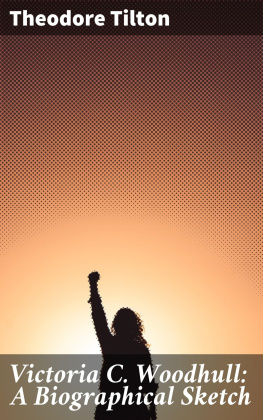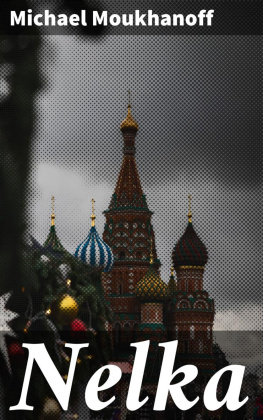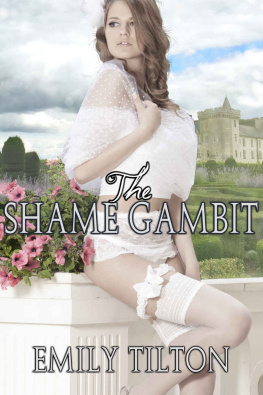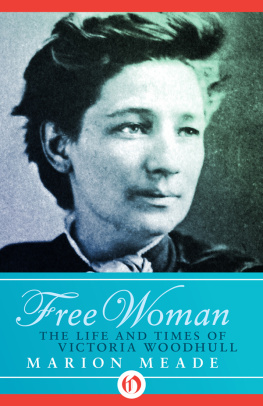MR. TILTON'S ACCOUNT OF MRS. WOODHULL.
"He that uttereth a slander is a fool."
Solomon : Prov. x. 18.
I shall swiftly sketch the life of Victoria Claflin Woodhull; a young woman whose career has been as singular as any heroine's in a romance; whose ability is of a rare and whose character of the rarest type; whose personal sufferings are of themselves a whole drama of pathos; whose name (through the malice of some and the ignorance of others) has caught a shadow in strange contrast with the whiteness of her life; whose position as a representative of her sex in the greatest reform of modern times renders her an object of peculiar interest to her fellow-citizens; and whose character (inasmuch as I know her well) I can portray without color or tinge from any other partiality save that I hold her in uncommon respect.
In Homer, Ohio, in a small cottage, white-painted and high-peaked, with a porch running round it and a flower garden in front, this daughter, the seventh of ten children of Roxana and Buckman Claflin, was born September 23d, 1838. As this was the year when Queen Victoria was crowned, the new-born babe, though clad neither in purple nor fine linen, but comfortably swaddled in respectable poverty, was immediately christened (though without chrism) as the Queen's namesake; her parents little dreaming that their daughter would one day aspire to a higher seat than the English throne. The Queen, with that early matronly predilection which her subsequent life did so much to illustrate, foresaw that many glad mothers, who were to bring babes into the world during that coronation year, would name them after the chief lady of the earth; and accordingly she ordained a gift to all her little namesakes of Anno Domini 1838. As Victoria Claflin was one of these, she has lately been urged to make a trip to Windsor Castle, to see the illustrious giver of these gifts, and to receive the special souvenir which the Queen's bounty is supposed to hold still in store for the Ohio babe that uttered its first cry as if to say "Long live the Queen!" Mrs. Woodhull, who is now a candidate for the Presidency of the United States, should defer this visit till after her election, when she will have a beautiful opportunity to invite her elder sister in sovereigntythe mother of our mother countryto visit her fairest daughter, the Republic of the West.
It is pitiful to be a child without a childhood. Such was she. Not a sunbeam gilded the morning of her life. Her girlish career was a continuous bitternessan unbroken heart-break. She was worked like a slavewhipped like a convict. Her father was impartial in his cruelty to all his children; her mother, with a fickleness of spirit that renders her one of the most erratic of mortals, sometimes abetted him in his scourgings, and at other times shielded the little ones from his blows. In a barrel of rain-water he kept a number of braided green withes made of willow or walnut twigs, and with these stinging weapons, never with an ordinary whip, he would cut the quivering flesh of the children till their tears and blood melted him into mercy. Sometimes he took a handsaw or a stick of firewood as the instrument of his savagery. Coming home after the children were in bed, on learning of some offence which they had committed, he has been known to waken them out of sleep, and to whip them till morning. In consequence of these brutalities, one of the sons, in his thirteenth year, burst away from home, went to sea, and still bears in a shattered constitution the damning memorial of his father's wrath. "I have no remembrance of a father's kiss," says Victoria. Her mother has on occasions tormented and harried her children until they would be thrown into spasms, whereat she would hysterically laugh, clap her hands, and look as fiercely delighted as a cat in playing with a mouse. At other times, her tenderness toward her offspring would appear almost angelic. She would fondle them, weep over them, lift her arms and thank God for such children, caress them with ecstatic joy, and then smite them as if seeking to destroy at a blow both body and soul. This eccentric old lady, compounded in equal parts of heaven and hell, will pray till her eyes are full of tears, and in the same hour curse till her lips are white with foam. The father exhibits a more tranquil bitterness, with fewer spasms. These parental peculiarities were lately made witnesses against their possessors in a court of justice.
If I must account for what seems unaccountable, I may say that with these parents, these traits are not only constitutional but have been further developed by circumstances. The mother, who has never in her life learned to read, was during her maidenhood the petted heiress of one of the richest German families of Pennsylvania, and was brought up not to serve but to be served, until in her ignorance and vanity she fancied all things her own, and all people her ministers. The father, partly bred to the law and partly to real-estate speculations, early in life acquired affluence, but during Victoria's third year suddenly lost all that he had gained, and sat down like a beggar in the dust of despair. The mother, from her youth, had been a religious monomaniaca spiritualist before the name of spiritualism was coined, and before the Rochester knockings had noised themselves into the public ear. She saw visions and dreamed dreams. During the half year preceding Victoria's birth, the mother became powerfully excited by a religious revival, and went through the process known as "sanctification." She would rise in prayer-meetings and pour forth passionate hallelujahs that sometimes electrified the worshippers. The father, colder in temperament, yet equally inclined to the supernatural, was her partner in these excitements. When the stroke of poverty felled them to the earth, these exultations were quenched in grief. The father, in the opinion of some, became partially crazed; he would take long and rapid walks, sometimes of twenty miles, and come home with bleeding feet and haggard face. The mother, never wholly sane, would huddle her children together as a hen her chickens, and wringing her hands above them, would pray by the hour that God would protect her little brood. Intense melancholya misanthropic gloom thick as a sea-fogseized jointly upon both their minds, and at intervals ever since has blighted them with its mildew. It is said that a fountain cannot send forth at the same time sweet waters and bitter, and yet affection and enmity will proceed from this couple almost at the same moment. At times, they are full of craftiness, low cunning, and malevolence; at other times, they beam with sunshine, sweetness, and sincerity. I have seen many strange people, but the strangest of all are the two parents whose commingled essence constitutes the spiritual principle of the heroine of this tale.
Just here, if any one asks, "How is it that such parents should not have reproduced their eccentricities in their children?" I answer, "This is exactly what they have done." The whole brood are of the same featherexcept Victoria and Tennie. What language shall describe them? Such another family-circle of cats and kits, with soft fur and sharp claws, purring at one moment and fighting the next, never before filled one house with their clamors since Babel began. They love and hatethey do good and evilthey bless and smite each other. They are a sisterhood of furies, tempered with love's melancholy. Here and there one will drop on her knees and invoke God's vengeance on the rest. But for years there has been one common sentiment sweetly pervading the breasts of a majority towards a minority of the offspring, namely, a determination that Victoria and Tennie should earn all the money for the support of the numerous remainder of the Claflin tribewives, husbands, children, servants, and all. Being daughters of the horse-leech, they cry "give." It is the common law of the Claflin clan that the idle many shall eat up the substance of the thrifty few. Victoria is a green leaf, and her legion of relatives are caterpillars who devour her. Their sin is that they return no thanks after meat; they curse the hand that feeds them. They are what my friend Mr. Greeley calls "a bad crowd." I am a little rough in saying this, I admit; but I have a rude prejudice in favor of the plain truth.







